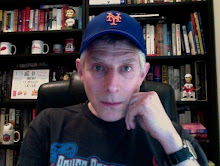 |
| You gotta have balls to play in the nation's capital |
The date: July 23, 1969. The event: MLB's 40th All Star Game. It would be Washington's fourth such affair and its last for nearly half a century. And it couldn't have come at a worse time for the host American League.
It was a time of National League dominance, the likes of which the mid-summer classic had never known. The so-called senior circuit had won each of the last six contests, 12 of the previous 15 and held an overall 21-17-1 advantage since the event's inception in 1933.
This sides for this outing at recently rechristened Robert F. Kennedy Memorial Stadium were decidedly lop. Thirteen NL players were destined for the National Baseball Hall of Fame, five were in the starting lineup including pitcher Steve Carlton and catcher Johnny Bench. The AL squad had just six, battery not included.
Rain had postponed the match for a day. Now, with Richard Nixon off to welcome the astronauts home from Tranquility Base, Vice President Spiro Agnew thew out the first ball. Maybe they should have left him in.
The New York Yankees' Mel Stottlemyre started for the Americans. He immediately yielded a single to the Pittsburgh Pirates' Matty Alou, who'd bat .331 that year. Alou moved to second on ground out by the Chicago Cubs' Don Kessinger. He went to third on a wild pitch, then scored when hometown hero Frank Howard misplayed Hank Aaron's shot to left.
 |
| One hot dog and two Franks |
Cleon Jones of the New York Mets led off the second with a single. Bench's two-run belt brought him home. In the bottom of the frame, the 6'7" Howard -- aka the Washington Monument, aka The Capital Punisher -- took Lefty deep for shot of redemption. NL 3, AL 1 after two.
Any good feeling in the home dugout quickly dissipated.
Aaron started the third with a hit off the Oakland A's Blue Moon Odom. Then Cooperstown-bound Willie McCovey homered. An out, an error, a single and two doubles later, the National League had three more runs. Though Detroit Tigers catcher Bill Freehan replied with a solo shot, McCovey cracked his second round-tripper an inning later, this one served up by the Tigers' Denny McLain.
When Freehan's single -- off the peerless Bob Gibson -- drove in pinch runner Reggie Smith in the 4th, the game still had the look of slugfest. The Nationals had three homers and nine runs. The Americans had two taters and three runs. And the game wasn't half over.
Except that it was.
Both sides combined for just three hits the rest of the way, no more than one in any single frame. The Cleveland Indian's Sam McDowell, aka Sudden Sam, fanned four in two innings of work. He was one of three AL hurlers to hold the NL at bay.
 |
| Baseball and a tax break |
Some of the senior circuit's gaudiest stars were relegated to just bit parts. Willie Mays pinch hit and skied to right. Ernie Banks pinch hit and lined out. In his lone plate appearance, Roberto Clemente fanned. Pete Rose, destined to be baseball's all-time hits leader and then a Hall of Fame pariah, popped out.
Tom Seaver, in the midst of a 25-win Cy Young Award season, never pitched.
Each of the junior circuit's future Hall inductees, including Carl Yastrzemski, Harmon Killebrew and Brooks Robinson, went hitless.
McCovey, with his two homers and three runs batted in, was the game's most valuable player. By season's end, with a .320 average, 45 homers and 126 RBIs was the league's MVP too.
Cleon Jones hit .340 -- third best in the NL behind Rose, .348 and Clemente, .345 -- and caught the final out as the Miracle Mets won the World Series, 5 games to 1, over the Baltimore Orioles. It was their first winning season since their birth in 1962.
 |
| Bench and McCovey - two for the Hall |
The host Senators, managed by Ted Williams -- aka the Splendid Splinter, Teddy Ballgame and Ted Fucking Williams -- were never better, posting an 86-76 record. It would be their only winning season in 11 Washington campaigns.
By 1972, they were gone, relocated to Arlington, Texas, as the Rangers.
Having previously lost the original Senators franchise (sometimes confusingly called the Nationals) to Minnesota, the District of Columbia was left pining for a team to call it's own for 34 years.
In 2005 it got one, the Montreal Expos. They called RFK Stadium their home for three years before moving into the brand new Nationals Park. There the stars will come out again on Tuesday night.
Follow me on Twitter @paperboyarchive

No comments:
Post a Comment